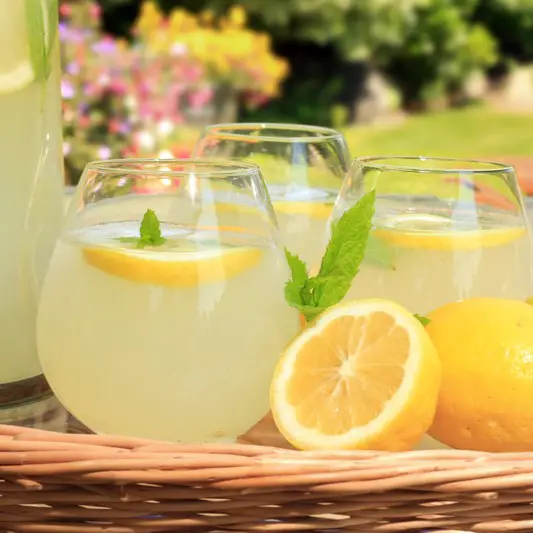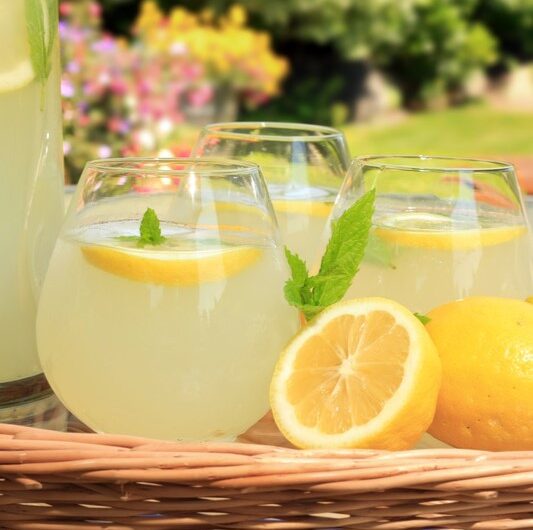As the mercury rises and the days stretch longer, there’s nothing quite as quintessentially summer as a glass of ice-cold lemonade. This beloved beverage, a simple concoction of lemons, sugar, and water, transcends age, culture, and geography, becoming a symbol of seasonal joy. But what elevates a basic lemonade to a drink you’ll crave all summer? It’s all about the balance of sweetness and tartness, the quality of the ingredients, and a few secret touches that can transform this simple drink into an extraordinary one.
Mastering the Classic Lemonade Recipe
The foundation of any great lemonade begins with the lemons themselves. Opting for fresh, juicy lemons rather than bottled lemon juice makes a significant difference. The zest and juice of these sunny fruits, when mixed with just the right amount of sweetness, create a refreshing balance that quenches thirst and revives the spirit.
Creating a perfect lemonade starts with making a simple syrup. This method involves dissolving sugar in boiling water, which is then cooled and mixed with freshly squeezed lemon juice. The ratio of lemon juice to syrup can be adjusted based on your personal taste preferences for sweetness or tartness.
Enhancing your lemonade can involve infusing it with herbs like mint or basil, which add a fresh, aromatic quality. This simple twist can elevate your lemonade from ordinary to extraordinary, making each sip a little more special.
Tip: Use organic sugar or honey for a richer, more nuanced sweetness that complements the zestiness of the lemons.
Exploring Flavor Variations
Summer is the season of abundant fruits, and incorporating them into your lemonade not only adds variety but also layers of delightful flavors. From the rich, dark tones of blackberry to the sweet, lushness of peach, each fruit can offer a unique twist to your beverage.
Experimenting with different fruit purees, such as strawberry, watermelon, or blueberry, is an easy way to customize your lemonade. These additions introduce vibrant colors and tastes that reflect the summertime’s bounty.
For those seeking a more exotic flair, spices like lavender or ginger can be infused into the simple syrup, offering a surprising twist that tickles the palate and enhances the lemonade’s refreshment factor.
Tip: Always strain fruit purees to ensure your lemonade remains smooth and free from seeds and pulp.
Enhancing Presentation and Serving
How you serve lemonade can be just as important as how you make it. Using clear pitchers and adding slices of lemon or sprigs of herbs not only makes your lemonade visually appealing but also adds a hint of flavor to the drink as it chills.
Consider serving your lemonade in unique glasses or mason jars for a rustic, charming look. Adding decorative straws or garnishes can make each glass feel like a special treat, perfect for summer gatherings.
For outdoor events, keeping your lemonade iced without diluting it can be a challenge. Opt for large ice blocks or frozen fruit instead of ice cubes to keep the lemonade cool longer without watering it down.
Tip: Create a self-serve lemonade bar at your next party with different syrups, fruits, and herbs, allowing guests to customize their drinks.
In conclusion, the perfect lemonade is not just about a recipe but an experience. Whether sipped on a shady porch, enjoyed at a sunny beach, or served at a lively family reunion, it embodies the essence of summer. By mastering the classic recipe, exploring new flavors, and presenting it in an inviting way, you can turn a simple lemonade into a memorable part of your summer adventures.
Ultimate Summer Lemonade
Course: BeverageCuisine: American4
servings30
minutes40
minutes300
kcalA refreshing twist on classic lemonade, infused with fruit purees and a hint of herbs, perfect for hot summer days.
Ingredients
1 cup fresh lemon juice
3/4 cup granulated sugar
1 cup water (for simple syrup)
4 cups cold water (to dilute)
1/2 cup fruit puree (strawberry, peach, or raspberry)
Fresh herbs (mint, basil) for garnish
Directions
- Begin by preparing the simple syrup. Heat 1 cup of water in a saucepan over medium heat. Add the granulated sugar and stir continuously until the sugar completely dissolves and the mixture is clear. Remove from heat and let cool to room temperature.
- In a large pitcher, combine the cooled simple syrup with fresh lemon juice. Add the 4 cups of cold water and stir well. Taste and adjust sweetness or dilution as needed.
- Stir in your choice of fruit puree to the lemonade mixture, blending thoroughly. This adds a lovely color and enhances the flavor profile of the lemonade.
- Serve the lemonade over ice in tall glasses. Garnish with sprigs of fresh herbs like mint or basil to add a refreshing aroma and a touch of elegance.
Notes
- For best results, use freshly squeezed lemon juice for a brighter, more vibrant flavor.
- If the lemonade is too tart, add more sugar or a little honey to balance the acidity.
- Experiment with different fruit purees like raspberry, strawberry, or peach for variety.
Frequently Asked Questions About Making Lemonade
Q: Can I make lemonade without sugar?
A: Yes, you can make lemonade without traditional sugar by substituting it with honey, agave syrup, or even artificial sweeteners. Adjust the quantity to taste, keeping in mind that each sweetener has a different level of sweetness.
Q: How long can homemade lemonade last in the refrigerator?
A: Homemade lemonade can last in the refrigerator for about 5-7 days when stored properly in a clean, airtight container. Always give it a good stir before serving, as ingredients may settle at the bottom.
Q: Can I freeze lemonade?
A: Yes, lemonade can be frozen and kept for up to 4-6 months. Freeze it in ice cube trays or freezer-safe containers. This is also a great way to chill the lemonade without diluting it when serving.
Q: What are the best lemons to use for making lemonade?
A: For the best tasting lemonade, use fresh, ripe lemons like Meyer lemons, which are slightly sweeter and less acidic than regular lemons. However, any type of fresh lemons will work well.


